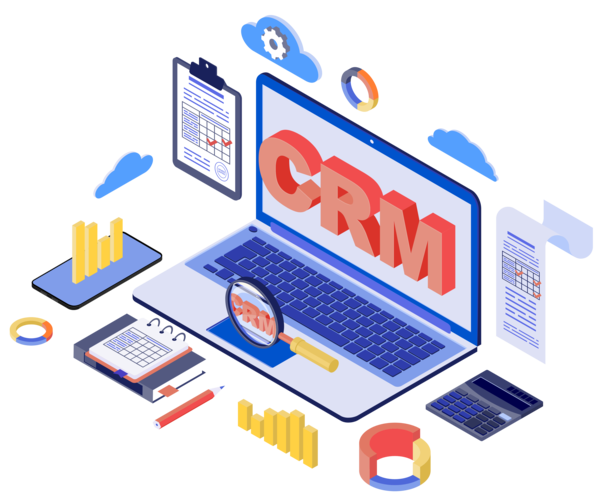Without customers, a business stands nowhere. To make sure your business gets the desired exposure and climbs the pinnacle of success, just having satisfied customers is not good enough anymore. You need to create fans! A custom CRM is the first step towards this! We, in this article, will explain why every business needs custom CRM. We also discuss the different types of Custom CRM solutions and what features every CRM must have. Lastly, we leave you with a cost estimation for developing a custom CRM.
“There is only one boss. The customer. And he can fire everybody in the company from the chairman on down, simply by spending his money somewhere else.” -Sam Walton
When a business is just starting off, we don’t expect it to acquire a huge number of leads immediately. So, maintaining an excel to keep a track of the customers seems fine then. But as you prosper, your customer directory keeps getting bigger and keeping a track of it in excel keeps getting harder. This is when you should think about adopting a CRM software.
Gartner predicts that by 2021, CRM will be the single largest revenue area of spending in enterprise software.
Let’s get started!
What is a CRM?
Big-fat-marketing-hardcovers will bring CRM , the abbreviation that expands to Customer Relationship Management, to you in ways that will probably push you into a bottomless pit. ..And that’s precisely the reason why we are starting with a simplified understanding of CRM before you nurture your plan for CRM development.
CRM is a term summarizing all things customer – the end-to-end process of customer management starting from ‘researching & developing strategies to attract customers’ to ‘selecting technologies, tools & techniques to acquire & retain them’ and everything in between.
What is CRM Development?
Going by the above statement, CRM looks like an essential mess, doesn’t it?
Implying, while eyeing better customer engagement, you can’t deprioritize any of the elements of Customer Relationship Management and on the other hand, organizing & tracking if the elements are always on top of their expected performance gets overwhelming, to say the least.
Above is the problem and CRM development is the effective & ingenious solution.
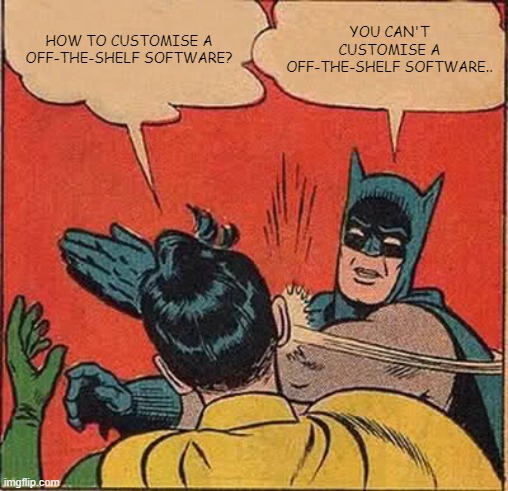
(Why) Do You Need CRM Development?
“My customer circle is barely a half circle”
“My marketing team is better called a marketing clique..it’s that small”
…If the above perfectly spell your justification for why your business shouldn’t invest in CRM development – this segment is tailored for you!
Managing even a handful of customers whom you can name counting on your fingers which you think to be a breeze, may actually mean – potential leads falling off the radar unnoticed, existing customers exploring other options to shift base and more.
Let’s take up the following questionnaire to find out if :
“You need to opt for CRM development OR You need not”
Question 1 : Are you actively attending your (existing + willing-to-be) customers’ queries?
Rule 101 of customer relationship management : do not alienate a customer inquiry – whether it’s a call or an email or even a DM at a Social Media, coming from a returning customer (remember, they do have other choices!) or a potential one (they have better pass time activities than contacting you, read ‘opportunity’!).
Competitions are a part of any discussion about SMEs, just how water is a part of all diets. To impress customers, there’s no substitute of great effort and cutting down efforts on that part directly impacts customer satisfaction. While ROI for other expenses are dependent on a number of associated factors, investments around customer management are pretty black and white: if you ease their lives & add convenience, they will choose you ad infinitum. CRM ensures every call is received and channelized to the concerned person, recorded for internal improvement, every email is acknowledged and more. Custom CRM software have flexi scope, meaning you can handpick striking elements like a cutting-edge chatbot which can handle basic live user queries with a human touch adding up to user experience.
Question 2 : Are you unifying all the customer centric plans, executions and their performances?
Let’s visualize a situation :
Christmas is nearing and for a houseparty, all the six family members are supposed to do the entire arrangement. What if the plan is never tracked and 3 of them get into decoration & the other 3 devote their day-and-night to make the best turkey roast of all times. Nice and fine? Not really..because, nobody bothers to invite the guests, clean the house, buy the gifts..
Put in the CRM context, without a centralized system keeping track of all the efforts going into customer relationships, no amount of effort can add any value at all.
Relying on pen-and-paper for monitoring the marketing & sales cycle?
Would have worked till the 60's..
Accounting in Excels because pen-and-paper isn’t enough?
Was the best option till the 90's..
Today, taking any of those shortcuts to excel at customer capture & retention just won’t work even with the most hardworking employees onboard.
That’s exactly why there’s so much buzz around CRM-systems for all the RIGHT reasons (coming to that in a bit!).
Question 3 : How long will it take for you to get an insider sales stat if I ask you now?
If you take more than 1 minute to answer, investing in CRM development isn’t a choice for you anymore, it’s a mandate!
Nobody will even know about your business if you yourself are not aware of your drill.
Wondering what drill I’m talking about?
Knowing what balls you throw into air and which ones out of those are worth continuing the juggle with!
That new year coupon brought in more customers?
Bring it back on Easter!
This ad failed to impact as expected?
Pull it out!
With a CRM system that’s tailored to complement your vision, you will get insights from all the ongoing and past campaigns under 30 seconds – did you hear improved resource allocation and enhanced bottomline?
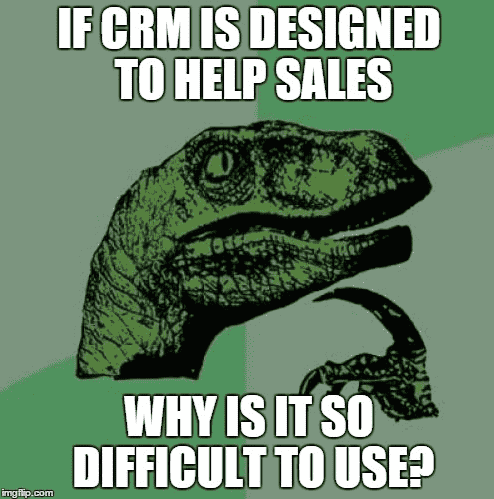
Customized CRM Vs. Off-the-shelf CRM
Customized CRM Vs. Off-the-shelf CRM
“This or that” is a perennial question, put in any context and the struggle is real.
While it’s easier to make a choice between a red or black dress for NYE party outfit because that doesn’t make MUCH difference unless you are a red carpet celeb, when it comes to the business backdrop, choosing where to invest those hard earned bucks so that the ROI doesn’t surprise you at the last moment (well, in a bad way) and the business soars above status quo at the same time, is the real task.
..Not with the facts lying at hand though and congratulations, you’re about to be saved from THAT struggle.
So, back to the relevant ‘This Or That’,
To Buy OR To Build – To Opt For “Customized CRM OR Off-the-shelf CRM”?
Let’s do a quick experiment –
First, have a look at the picture below.
.jpg)
Now tell me, which element of the picture had caught your attention at one look?
Clearly, the green candy.
That’s how anything ‘custom’ steals the show – not just apparently, but actually, here’s how a custom CRM in a crowd of OTS CRMs scores high on effectiveness & efficiency!
[1] Custom CRM is structured around your interest while OTS CRM moulds your interest according to its own generic structure
Starting with the basic fundamentals of an OTS CRM, i.e., it isn’t for YOU, it’s for ALL with similar requirements, entirely overlooking the fact that two businesses are only as ‘similar’ (pun intended) as two fingerprints – hardly ever alike, if not never.
Thus, every feature of an OTS CRM revolves around most of its wide target users’ approach towards customer relationship.
If you are following the ‘Go-with-the-flow’ ideology, settle with one such OTS.
Loyal to ‘innovation and unique approach’ when it comes to customer management?
Sounds like the reason CRM development became a thing over the years because the leading businesses across varied industries weren’t ready to compromise on their secret sauce like you, too.
So, for those who chose greater convenience over unnecessary complexity, custom CRM development came into the picture. With every functionality enhancing a business’s specific strategies, techniques and ultimately, the bottomline, custom CRM makes your business goals its bird’s eye objective.
[2] OTS CRM brings in a steep learning curve, Custom CRM reverses it
Number of companies providing off-the-shelf CRMs are many, including big names like Salesforce, Zoho, SAP, which seem to come for an affordable price tag. But, are those compatible with your workforce’s tech understanding? Did that question just drop the thinking cap right on?
Well, it’s not you, it’s another limitation of OTS CRM- while the features are fixed, the way it can be put to use for maximized efficiency varies for every individual business. To make it worse, there’s no user manual to follow for that, so your team has to opt for the ‘trial & error’ method to discover the process to explore the full potential of the OTS. Do I need to mention the errors are far more expensive than the upfront cost that impressed you in the first place?
On contrary to that, for the ones who don’t like risking their workforce’s time and effort, custom CRM development is the safe option, where time is saved, productivity is pulled up and such chances of ‘expensive errors’ are avoided- as there goes in ample input from the team at the development stage, in terms of what they are familiar with and can adapt to, without undergoing lengthy training sessions.
The first issue that arises with these commercial CRMs is that it takes a good amount of time training the employees and getting them habituated with the software.
[3] Custom CRM can befriend external systems, OTS CRMs are mostly integration impaired
Suppose,
Business X uses three software for functioning – A, B & C
Business Y uses four software for functioning – B, D, E & F
Business Z uses two software for functioning – A & F
Now if you’re supposed to make a common OTS CRM for them, you have two options –
(i)You make the system integrate with all the software – which, most obviously, won’t be an option as the pricing will skyrocket
(ii) Make the system compatible to the commonly used ones, say A, B & F – cheaper and easier choice
OTS CRMs prioritize the latter, thus, adds in another burden of manual input requirements to get the business processes going.
However, custom CRM development focuses on ease of business process execution and so enables easy integration with existing third-party tools & systems.
[4] OTS CRMs Are Hardly Scalable, For Custom CRM- Replace ‘Hardly’ With ‘Mostly’
Asking if a business wishes to grow is like asking an individual if they want a vaccine during Covid times, the answer will be YES. Wishing isn’t enough, because if you water well, a sapling will grow into a large tree for sure but without a mechanism in place that can hold the growing base of it, the growth will be pointless. Same thing holds true for your business. If you foresee growth, you must ensure your CRM can withstand 10X customer base and for that, scalability where your business is expected to grow, plays a major role.
While scaling up an off-the-shelf CRM at a space where your business chooses to grow might be synonymous to loads of money, effort & a task high on the difficulty level (as it’s prepped for generic scalability in selected aspects) , custom CRM helps in scaling up the entire system infrastructure or any part that you wish to, when required, without significantly increasing the expenditure.
[5] OTS CRM Is Like A The Common Apartment Entrance, Custom CRM is The Personal – So Are Their Security
Basically, OTS CRMs are hosted on third party servers, meaning, source code and system rights belong to those third-parties only, whereas, custom CMS is hosted on the cloud or sometimes, the your own server, where no one but you have the access. So, by hiring the right custom software development partner, you sign up for better security along with the said CRM development.
Convinced why every expanding business needs a custom CRM? Awesome! Let’s quickly take a look at the different types of CRM and some crucial features that every CRM, irrespective of whether its bespoke or readymade, should have in the next two sections.
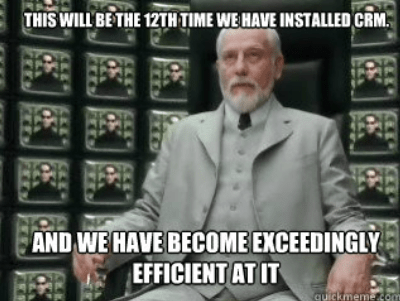
Types of Customer Relationship Management Software
[1] Operational CRM
Any sort of CRM that is focussed on customer centric business automation and improvement and enhancement of business processes falls under Operational CRM.
Sales, Marketing and Service automation are the main categories of Operational CRMs.
[2] Analytical CRM
CRM built to analyse data of all sorts ( contact data, customer information, payment history etc, derived both online and offline) for companies to obtain customer insights and predict their future behaviour are called Analytical CRM.
[3] Collaborative CRM
CRM built with the purpose of synchronization and integration of customer data from various departments like sales, marketing, finance is a collaborative CRM. The main purpose here is to improve the customer service quality and increase customer retention.
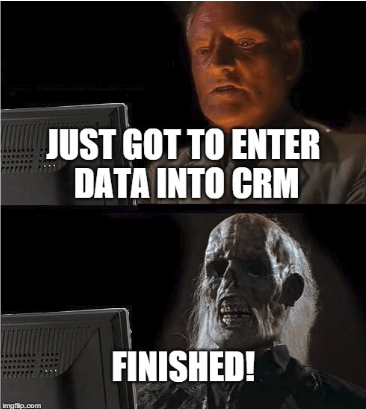
CRM software development – Crucial CRM Features
[a] Contact management
Highly debated as one of the most important aspects of a Customer Relationship Management software, contact management module helps in recording customer details and tracking their interactions with a business.
This, in turn, provides a unified view of customers and helps business focus on improving sales and customer support leveraging the wide range of data. This also helps create better, longer-lasting customer relationships.
[b] Lead management
Leads are something business cannot do without. And when we are building a CRM, why not include a module that keeps track of all your leads from all possible sources along with their interests, activities, behavior etc together in one place? This is what a lead management module does.
This will help your sales and marketing team to work together to qualify them as customers and make sure you never miss on another interaction or follow up.
[c] Task management
A task manager helps organize everything and keep a track of tasks from beginning to end, tracking subtasks, assigning priority and setting deadlines to make sure the project is delivered on time. Task management module in your CRM helps in increasing productivity across your organization and collaborating at scale.
The task manager module must also be able to integrate with device calendar, edit calendar events and set reminders. Also, share your files with your team and track the content in real-time.
[d] Email marketing
When we talk about leads, we got to talk about email marketing too. Even in 2019, 93% of B2B marketers use email to distribute content. Integrating email marketing with your CRM will not only help you manage your campaigns better but will also increase the ROI from the campaigns.
You can further pull data from the CRM to segment your customer list based on demography, interest, industry and personalize the messages for each segment.
[e] Dashboard and reports
The main purpose of a CRM is to gain insights on customers and their complete user cycle. Custom reporting helps you achieve that and more. What campaigns converted the best, which product performed the best, what was the ROI on email marketing etc can be measured with the help of charts and graphs.
This helps get a holistic view of the complete data in one go and can be leveraged by executives to take decisions in order to maximize organizational efficiency.
[f] Mobile access
Nobody pays for seat warmers nowadays. Employees need to access the CRM and manage key information anywhere and anytime. Mobile CRM does just that – it delivers a full CRM experience on smartphones and tablets.
Mobile CRM allows employees more flexibility and access to real-time updates and vital information, so that you can run your business on the go!
[g] Integration with social media
The number of social media users worldwide in 2019 is 3.484 billion. This ever-increasing group of potential leads spread over Facebook, Twitter and LinkedIn presents businesses with the easiest opportunity to score. So, integrating your CRM to social media is the need of the hour.
Track brand mentions, customer reviews and reply to customer concerns over social media to take your lead generation and marketing to the next level.
So, with the features under our grasp, let’s see how much does it cost to build a custom CRM?
With the above-mentioned features, a custom CRM will cost somewhere between $20K-$40K. If you further add, chatbots, sales forecast, integration with other third party apps, costs will significantly increase.
Though you might find a readymade CRM solution at a much lesser cost, in the long run, you would incur a hefty sum to customize the CRM and add or remove functionalities that are unique to your business.
Parting words:
Before you decide to build or buy, you need to identify your business needs. Ask yourself these set of questions:
- What functionalities does your CRM need?
- Is your team small or big?
- How scalable do you want your CRM to be?
- Do you need to integrate your CRM with other systems?
- Do you need your CRM tomorrow or you can wait a few months?
If you know the specific functionalities and have a team that will scale in the near future and require third party integrations along with time being not such a big concern for you, we recommend custom CRM development. A all-in-one CRM software provides visibility and is more connected and accessible. It is also cost effective in the long run. BinaryFolks has experience in developing custom CRMs for both enterprises and startups. Got a business idea? Awesome! The first consultation is on us 🙂


